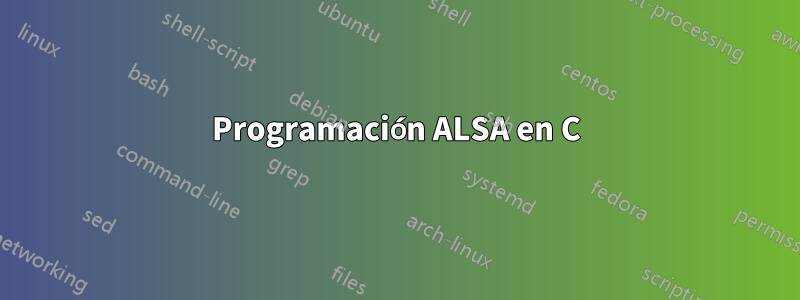
Estoy usando un programa en C que me ayuda a grabar desde mi dispositivo de audio. Aquí está el código:
/* Use the newer ALSA API */
#define ALSA_PCM_NEW_HW_PARAMS_API
#include <alsa/asoundlib.h>
int main() {
long loops;
int rc;
int size;
snd_pcm_t *handle;
snd_pcm_hw_params_t *params;
unsigned int val;
int dir;
snd_pcm_uframes_t frames;
char *buffer;
/* Open PCM device for recording (capture). */
rc = snd_pcm_open(&handle, "default",
SND_PCM_STREAM_CAPTURE, 0);
if (rc < 0) {
fprintf(stderr,
"unable to open pcm device: %s\n",
snd_strerror(rc));
exit(1);
}
/* Allocate a hardware parameters object. */
snd_pcm_hw_params_alloca(¶ms);
/* Fill it in with default values. */
snd_pcm_hw_params_any(handle, params);
/* Set the desired hardware parameters. */
/* Interleaved mode */
snd_pcm_hw_params_set_access(handle, params,
SND_PCM_ACCESS_RW_INTERLEAVED);
/* Signed 16-bit little-endian format */
snd_pcm_hw_params_set_format(handle, params,
SND_PCM_FORMAT_S16_LE);
/* Two channels (stereo) */
snd_pcm_hw_params_set_channels(handle, params, 2);
/* 44100 bits/second sampling rate (CD quality) */
val = 44100;
snd_pcm_hw_params_set_rate_near(handle, params,
&val, &dir);
/* Set period size to 32 frames. */
frames = 32;
snd_pcm_hw_params_set_period_size_near(handle,
params, &frames, &dir);
/* Write the parameters to the driver */
rc = snd_pcm_hw_params(handle, params);
if (rc < 0) {
fprintf(stderr,
"unable to set hw parameters: %s\n",
snd_strerror(rc));
exit(1);
}
/* Use a buffer large enough to hold one period */
snd_pcm_hw_params_get_period_size(params,
&frames, &dir);
size = frames * 4; /* 2 bytes/sample, 2 channels */
buffer = (char *) malloc(size);
/* We want to loop for 5 seconds */
snd_pcm_hw_params_get_period_time(params,
&val, &dir);
loops = 5000000 / val;
while (loops > 0) {
loops--;
rc = snd_pcm_readi(handle, buffer, frames);
if (rc == -EPIPE) {
/* EPIPE means overrun */
fprintf(stderr, "overrun occurred\n");
snd_pcm_prepare(handle);
} else if (rc < 0) {
fprintf(stderr,
"error from read: %s\n",
snd_strerror(rc));
} else if (rc != (int)frames) {
fprintf(stderr, "short read, read %d frames\n", rc);
}
rc = write(1, buffer, size);
if (rc != size)
fprintf(stderr,
"short write: wrote %d bytes\n", rc);
}
snd_pcm_drain(handle);
snd_pcm_close(handle);
free(buffer);
return 0;
}
para guardar la salida del programa tengo que usar:
gcc record.c -o out -lasound
./out >sound.raw
Mi problema es la última línea, quiero estar dentro del programa, lo que significa que la redirección de la salida no debe realizarse en absoluto, ¡el programa se ejecuta y guarda los datos! ¿Alguna idea de cómo puedo hacer eso?
Gracias de antemano por cualquier ayuda !
Respuesta1
La write(1, ...llamada escribe en la salida estándar. Cámbielo para escribir en un archivo.
(Y este programa carece de manejo de errores para todas las setfunciones).


